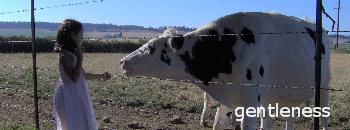I grew up thinking that strength meant being strong, showing strength in physical and emotional ways. It meant being unyielding, and it always implied pushing beyond limits and pushing others to push themselves beyond their personal limits. It was an ideal that everyone was supposed to live up to: always being strong and never giving in.
Gentleness, on the other hand, was seen as weakness in many cases. A gentle response to a problem was lame and ineffective. A gentle approach to a problem made no sense, because we surely can't "overcome" problems with a gentle approach.
But what if most problems don't need to be overcome? What if, instead, they need to be understood and worked through? What if gentleness is an approach that works more effectively in the long run, long past the time that the short-term fix that's based on strength or force ceases to be effective any more? Many people never will find out the effectiveness of gentleness because they'll always be convinced that they have to be strong in order to get things done.
Gentleness means recognizing that the world around us is fragile, especially
other people. It is recognizing our own capacity to do harm and choosing
to be tender, soft-spoken, soft-hearted, and careful. When we are gentle
we touch the world in ways that protect and preserve it. Being gentle
doesn't mean being weak; gentleness can be firm, even powerful.
-unattributed, Wisdom Commons
I was fortunate as a teacher to discover that the vast majority of my students responded much, much better to my gentleness than they did to my strength. They had enough "strong" teachers--they didn't need any more criticism, harshness, inflexibility, or punishment. The vast majority of them were doing the best they could, and they really appreciated it when I treated them gently rather than harshly.
Sometimes we feel pressure to be "in control" of things, and many of our so-called "teachers" in life--parents, relatives, bosses, and anyone else who has influence over us--try to convince us that being "in control" means that other people will bend to our will and act in ways we want them to. The kid who's making noise will shut up; the subordinate at work will do what they're told; nobody will argue with you for any reason at all.
But the gentle approach isn't concerned with directly controlling situations. Rather, the gentle person understands that often, things don't go right because someone doesn't understand something and needs to be taught, or someone is doing something wrong because they're hurting in an important and painful way, or a person doesn't respond well to suggestions or requests because they simply don't understand the importance of doing something in a certain way. In these cases--and many others--gently helping the person involved is generally much more effective than trying to "force" things to happen our way.
Don't judge the gentle; their gentleness is stronger than your fears and angers.
Don't judge those who have lost their gentleness; you haven't lived their lives.
In all people, hope for the gentleness to return and see gentleness
for the beauty that it is.
-C. JoyBell C.
One of the most important things that we can do in our lives is to adopt gentleness as an approach to the rest of life. When we're gentle, we allow others to be themselves rather than trying to force them to be something else. When we're gentle, we become an ally to other people rather than an enemy. When we're gentle, we show others their worth and value rather than trying to convince them that they're worthless if they don't do things our way. When we're gentle, we help people to heal rather than opening up new wounds.
Yes, there are times when a strong and unyielding approach is more effective, even necessary. But these times represent the exception rather than the rule.
A gentle approach to the world shows respect and allows others to keep their dignity. It shows the world that we're not so insecure that we must dominate and control others. It allows us to be an ally of life rather than a foe of life. And for ourselves, it gives us peace of mind and peace of heart when we focus on a gentle understanding rather than stressful conflict. Gentleness allows us to be in touch with our higher selves, that part of who we are that is able to share love, compassion, understanding, and hope with our fellow human beings.
In the broad picture of life, let me always be a person who chooses a gentle approach whenever I can.
Thoughts and ideas on what goes into living our lives fully and happily. There are no set answers here, just some observations of life and living that hopefully can help you to see things in a positive light!
07 July 2022
The Strength of the Gentle
Subscribe to:
Posts (Atom)
